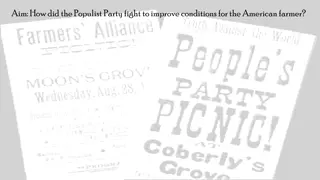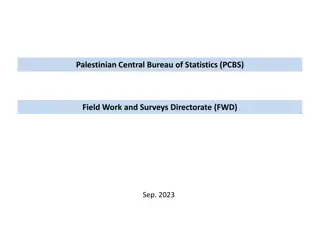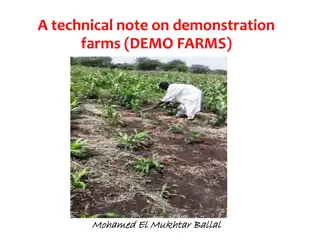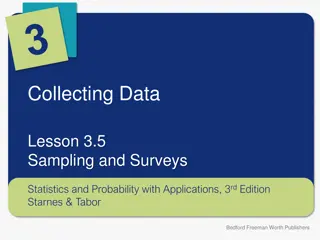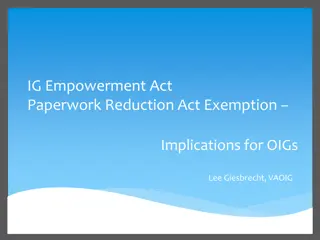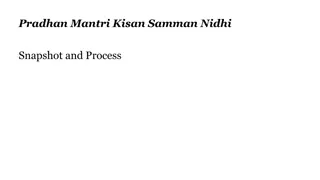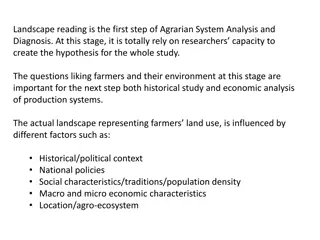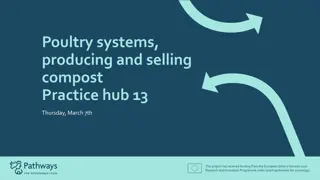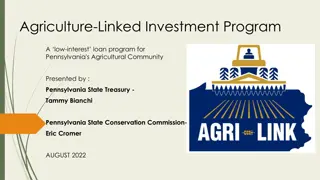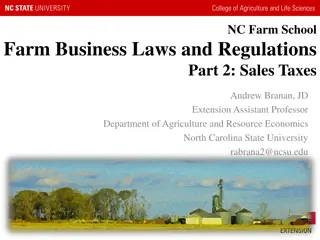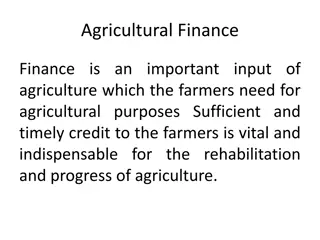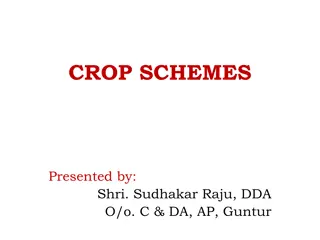Empowering Farmers Through Market Surveys
The market survey methodology outlined in the content focuses on empowering farmers by increasing their understanding of market dynamics, building relationships with market players, and enhancing decision-making skills. It involves structured steps like sensitization workshops, crop selection, and in-field trainings to engage farmers in conducting market surveys independently. The objective is to enable farmers to gather crucial market information and negotiate better terms with stakeholders. By following a participatory approach, farmers acquire practical skills and insights, leading to improved market engagement and profitability.
Download Presentation

Please find below an Image/Link to download the presentation.
The content on the website is provided AS IS for your information and personal use only. It may not be sold, licensed, or shared on other websites without obtaining consent from the author. Download presentation by click this link. If you encounter any issues during the download, it is possible that the publisher has removed the file from their server.
E N D
Presentation Transcript
Market Survey Market Survey Methods of Implementation Methods of Implementation Type the name of your organization here. 1
WHERE ARE WE?: WHERE ARE WE?: Market Survey in SHEP s 4 Steps Market Survey in SHEP s 4 Steps 4 Steps Activities 1. Share goal with farmers. Sensitization Workshop Participatory Baseline Survey (optional) Stakeholder Forum Market Survey 2. Farmers awareness is raised. Market Survey as a way to raise farmers awareness. Target Crop Selection Crop Calendar Making 3 . Farmers make decisions. 4. Farmers acquire skills. In-field trainings Follow-up and monitoring (including Participatory Endline Survey) 2
PART 1: CONCEPT PART 1: CONCEPT 3
WHY?: WHY?: Objectives of Market Survey Objectives of Market Survey SHEP s Farmer-initiated Market Survey has following aims. 1. The farmers will have hands-on experiences of understanding how markets operate and what markets want from the producers. 2. The farmers will be able to build a rapport with various market players (wholesalers, retailers, middlemen, etc.). 3. The farmers can create a win-win situation with the market stakeholders. 4
WHAT?: WHAT?: Outline Outline of Market Survey of Market Survey Farmer representatives chosen by the farmer groups attend a training on market surveys. During the training, the farmer representatives (1) learn how to conduct a market survey and (2) actually conduct a market survey at a local market as a practice. After the training, the farmer representatives teach other group members the result of the market survey as well as the method of conducting market surveys. 5
FORMAT: FORMAT: Market Survey Questionnaire Market Survey Questionnaire Information is filled out by the farmers when they visit markets. 6
HOW?: HOW?: Key Key I Implementation Tips mplementation Tips The market surveys should be conducted by farmers, not by government staff, with a questionnaire form in hand. Raising Motivation The market surveys aim at collecting information on not only market prices but also required quality and quantity of produce, seasonal fluctuations of prices and traded quantity, mode of payments, etc. 7
HOW?: HOW?: Key During the market surveys, the farmers are encouraged to establish business relationships with the market players they meet at the market. Raising Motivation Key I Implementation Tips mplementation Tips Farmers should understand that market surveys need to be carried out continuously by themselves on a regular basis without the help of the government. Raising Motivation 8
Market Survey In Depth: Market Survey In Depth: Three Principles of the SHEP Market Survey SHEP Market Survey Three Principles of the SHEP s Market Survey places an emphasis on supporting farmers psychological need for autonomy and competence. The Market Survey aims at collecting information; that suits the situations of the farmers, from a view point of the farmers, and; by the farmers in order for the farmers to explore business possibilities and options. These are the three principles of the SHEP Market Survey. 9
Market Survey In Depth: Market Survey In Depth: Three Principles of the SHEP Market Survey SHEP Market Survey Three Principles of the 10
Market Survey In Depth: Market Survey In Depth: Examples of Information collected Examples of Information collected by fulfilling Three Principles of the SHEP Market Survey by fulfilling Three Principles of the SHEP Market Survey 1 We realized we should harvest carrots earlier than we usually do. A little smaller carrots taste better and sell at a higher price than bigger carrots. 2 We ve found that we should harvest carrots very early in the morning when it s still dark outside. The carrots last longer when harvested that way. The buyers are willing to buy such carrots and give us a better price. 3 We ve realized that it is less risky to supply produce to the market constantly throughout the season than to supply them in a large quantity at one time. 4 We are convinced that certified seed and hybrid seed can produce better quality vegetables, which means we can sell them at a higher price. 5 We understand that timing of planting is important. We should plant seeds at the right timing, or should use seed of quick maturing varieties so that we can harvest in the peak-demand months. 11
Market Survey In Depth: Market Survey In Depth: Examples of Information collected Examples of Information collected by fulfilling Three Principles of the SHEP Market Survey by fulfilling Three Principles of the SHEP Market Survey 6 We discovered that at the wholesale market, a variety of cabbage with a long shelf-life is preferred. In contrast, a variety of cabbage which is sweet and succulent, suitable for salad is preferred at the retail market even if it has a shorter shelf-life. 7 We met a middleman during the market survey. We obtained information on preferred sizes (grade) of potatoes. After that, the middleman started to come to our farms regularly to buy our potatoes at a high price. 8 During the market survey, we realized among various banana products, banana biscuits are most popular in this locality. After that, we developed a small package of banana biscuits, which the existing market did not have. The package became the best seller at our group s store and many local children love this package of biscuits. 12
Market Survey In Depth: Market Survey In Depth: Path to Success Path to Success The information collected by fulfilling the three principles can be utilized by farmers (1) right away and (2) with minimal additional resources. easily leads to a small success big success Accumulation of small successes of the farmers can lead to a big success. small success small success small success small success 13
Mitigating Asymmetric Information Mitigating Asymmetric Information Market Survey tries to mitigate information gaps between farmers and market stakeholders. 14
PART 2: PRACTICE PART 2: PRACTICE 15
STEP: STEP: Implementation Procedures Implementation Procedures 1. (Preparation) Ask the farmer group select their representatives (an interviewer, note-taker and time- keeper, a total of three farmers) who will participate in the market survey training. [Tip!] Make sure to have both male and female representatives. 2. (Preparation) Obtain permission for conducting a market survey exercise from the manager(s) of the market. Conduct preliminary market surveys among the implementers before taking farmers to the market. Investigate and choose most appropriate day(s) of the week or time of the day for visiting the market. 16
STEP: STEP: Implementation Procedures Implementation Procedures 3. Organize a training to teach how to conduct the market survey, first; lectures and next, a practical market survey exercise at a nearby marketplace. 4. Recap the information the farmers have collected at the market. Ask them to share the information with other group members within a certain period of time (e.g. within a week after the market survey) . [Tip!] Make sure to set a clear timeframe for sharing the information with other farmers. The extension staff should help the representatives to organize the meeting in their community. 17
Filling out Market Survey Questionnaire Filling out Market Survey Questionnaire Basic information of the farmer group These are the main items of information to be collected from each buyer. Make sure to write down buyers mobile phone numbers. Write any other information in the blank space. Farmers are encouraged to gather any other relevant information they think is important to them. 18
CHECKLIST: CHECKLIST: Points to be Confirmed after Points to be Confirmed after Market Survey Survey The group members are informed of the findings and results of the market survey exercise by the farmer representatives. The target farmers understand the market survey conducted this time is a practice and real market surveys should be conducted on their own on a regular basis without help from the government. The target farmers maintain contact with the market stakeholders they visited during the market survey. The male-female ratio of the representatives from the group is balanced. The male-female ratio of the participants in the feedback meeting organized at the farmer group is balanced. Market 19
Market Survey in Action Market Survey in Action 20
TROUBLESHOOTING TROUBLESHOOTING What if the local market is too small? It is usually a good starting point to visit the nearest local market for a market survey exercise purpose. However, if you and the farmers feel that it would be more beneficial to visit different markets, for example, ones near big cities, you are welcome to do so. It is difficult to get accurate information on prices. Rather than focusing your questions on how much money the traders make, you may want to tactfully ask general questions such as annual price fluctuations on particular produce. 21
TROUBLESHOOTING TROUBLESHOOTING Levels of motivation among group members vary greatly. Please make sure the information on the market is shared widely and equally among the group members. Please consider setting a rule, for example, that the representatives should hold a group meeting with a week after the market survey to share the information. 22
Way Way Forward Forward: : Implementation Schedule, Implementation Schedule, Reporting, Reporting, add any other necessary info. here add any other necessary info. here 23




